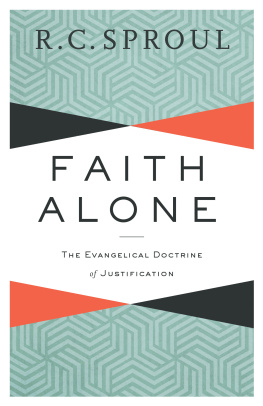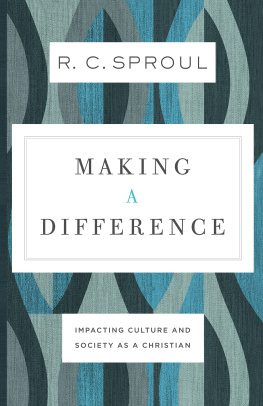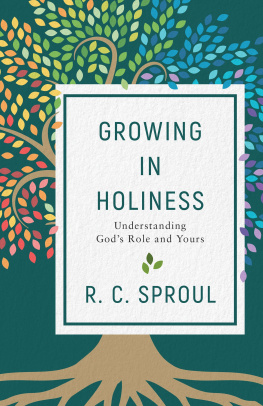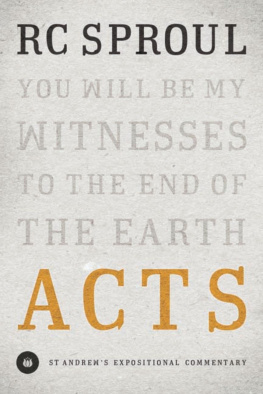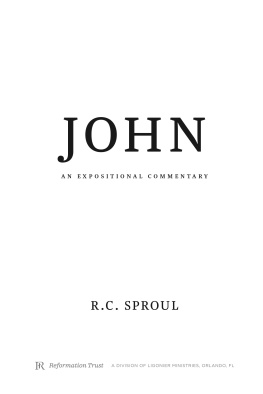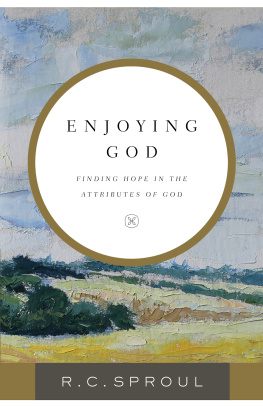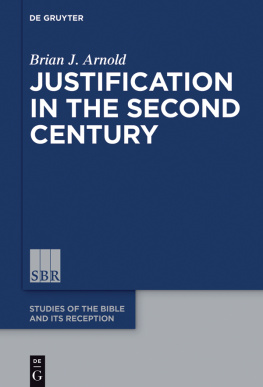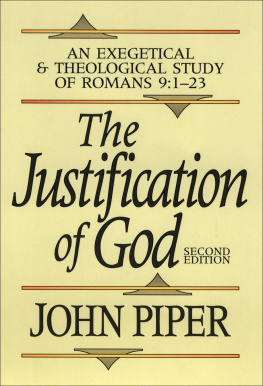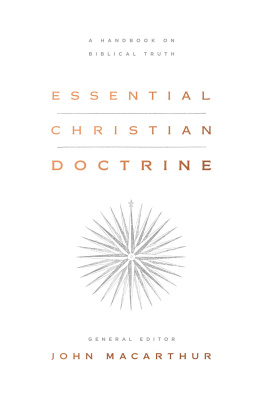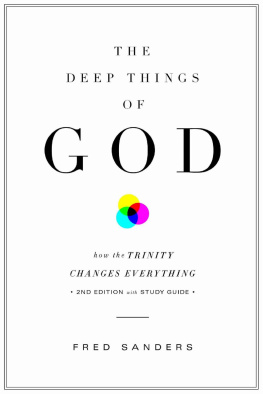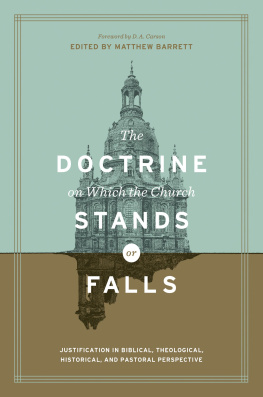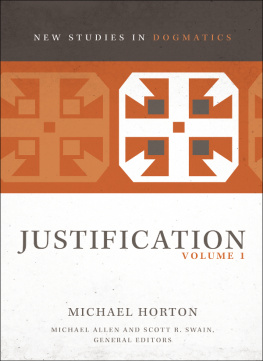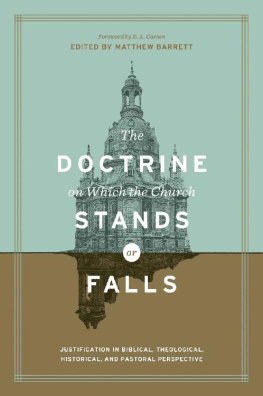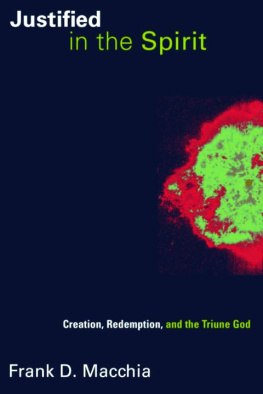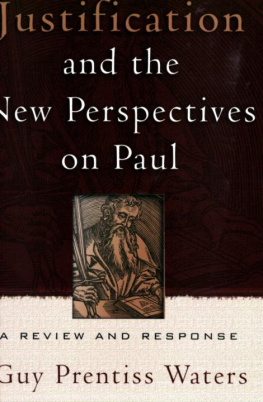R. C. Sproul - Faith Alone: The Evangelical Doctrine of Justification
Here you can read online R. C. Sproul - Faith Alone: The Evangelical Doctrine of Justification full text of the book (entire story) in english for free. Download pdf and epub, get meaning, cover and reviews about this ebook. year: 1999, publisher: Baker Publishing Group, genre: Religion. Description of the work, (preface) as well as reviews are available. Best literature library LitArk.com created for fans of good reading and offers a wide selection of genres:
Romance novel
Science fiction
Adventure
Detective
Science
History
Home and family
Prose
Art
Politics
Computer
Non-fiction
Religion
Business
Children
Humor
Choose a favorite category and find really read worthwhile books. Enjoy immersion in the world of imagination, feel the emotions of the characters or learn something new for yourself, make an fascinating discovery.
- Book:Faith Alone: The Evangelical Doctrine of Justification
- Author:
- Publisher:Baker Publishing Group
- Genre:
- Year:1999
- Rating:4 / 5
- Favourites:Add to favourites
- Your mark:
- 80
- 1
- 2
- 3
- 4
- 5
Faith Alone: The Evangelical Doctrine of Justification: summary, description and annotation
We offer to read an annotation, description, summary or preface (depends on what the author of the book "Faith Alone: The Evangelical Doctrine of Justification" wrote himself). If you haven't found the necessary information about the book — write in the comments, we will try to find it.
Faith Alone: The Evangelical Doctrine of Justification — read online for free the complete book (whole text) full work
Below is the text of the book, divided by pages. System saving the place of the last page read, allows you to conveniently read the book "Faith Alone: The Evangelical Doctrine of Justification" online for free, without having to search again every time where you left off. Put a bookmark, and you can go to the page where you finished reading at any time.
Font size:
Interval:
Bookmark:
1995 by R. C. Sproul
Published by Baker Books
a division of Baker Publishing Group
P.O. Box 6287, Grand Rapids, MI 49516-6287
www.bakerbooks.com
Ebook edition created 2013
Ebook corrections 11.15.2016, 01.21.2022
All rights reserved. No part of this publication may be reproduced, stored in a retrieval system, or transmitted in any form or by any meansfor example, electronic, photocopy, recordingwithout the prior written permission of the publisher. The only exception is brief quotations in printed reviews.
Library of Congress Cataloging-in-Publication Data is on file at the Library of Congress, Washington, D.C.
ISBN 978-1-4412-3686-9
Scripture marked NKJV is taken from the New King James Version. Copyright 1982 by Thomas Nelson, Inc. Used by permission. All rights reserved.
Scripture marked ASV is taken from the American Standard Version of the Bible.
For information about Ligonier Ministries and the teaching ministry of R. C. Sproul, visit Ligoniers web site: www.ligonier.org
R. C. Sproul and I share a number of common interests, none more precious to both of us than the doctrine of justification by faith alone. Sola fide (Latin for faith alone) was the material principle of the Protestant Reformation. Todays evangelicals tend to be unversed in Scripture and ignorant of their own history, so they are generally ill-equipped to defend what they profess to believe. And the doctrine of justification has been subjected to relentless attacks on several fronts in recent decades. One of the most disturbing elements of this devastating theological downgrade is the fact that some of the chief culprits arguing against sola fide have been people who self-identify as Protestants. Dr. Sproul has probably done more than anyone in our generation to reconnect contemporary evangelicals with their own rich history. In particular, he has been courageously defending the doctrine of justification for several decades. This book distills the best of his teaching on that issue. Its an important defense of the gospels cardinal principle in a clear and compelling format. Im happy to give it my most enthusiastic recommendation.
John MacArthur , author; speaker; pastor; president, The Masters College and Seminary
For as long as R. C. Sproul has been involved in public ministry, he has stood firm against theological error while battling boldly for doctrinal truth. In Faith Alone he demonstrates the critical importance of affirming and protecting that great Reformation doctrine of justification by grace alone, through faith alone. Always respectful toward others, he proceeds carefully, biblically, and with unrelenting force. This book remains as important and relevant today as when it was first published.
Tim Challies , blogger; author; pastor, Grace Fellowship Church, Toronto, Ontario
To
Dr. John H. Gerstner
Contents
Figures
Foreword
W hile only a generation ago Roman Catholics and Protestants rarely found their way into each others spiritual company, we now see them praying and reading Scripture together, and joining hearts, heads, and hands in the struggle against secularism. With the catholic creeds as a basis for cobelligerence, this grassroots ecumenism has produced much fruit. But it has also led to some rather naive lurches that substitute appearances of unity in the gospel for the reality. As todays political and moral struggles often form the basis for common action, the charismatic movement had already provided the tendency to relativize doctrinal distinctives and create a common basis in experience.
The evangelistic energy of evangelical Protestants has added the tendency to bury concern over the actual content of the evangel. One might say that in all of the activity, evangelism is too busy to be troubled with the evangel. In his broadly representative crusades, the Reverend Billy Graham was simply following in the footsteps of an earlier generation of Evangelicals whose missionary and evangelistic zeal encouraged them to play down doctrinal issues when founding the World Council of Churches. Reverend Graham recently reasserted his view of Roman Catholicism: I have found that my beliefs are essentially the same as those of orthodox Roman Catholics.
After decades of scurrilous caricatures and misinformation, Roman Catholics and Protestants are finally speaking to each other, and this is revealing a greater variety of viewpoints within both camps. It is also revealing (a) how little most Protestants know about their own convictions and (b) with what great ease they find the concerns raised by the Reformation to be simply irrelevant. How can this be? Has Romes position changed? In fact it has not. The Vatican II documents as well as the new Catechism of the Catholic Church reinvoke the theological position of the Council of Trent, condemning the gospel of justification by an imputed righteousness. If it is not Rome that has altered its position in favor of the gospel, then it must be the other partner that has moved from its earlier position.
According to George Barna, James Hunter, and others who have surveyed the drift in evangelical conviction, Evangelicalism is redefining itself doctrinally. From its views of the self (77% of Evangelicals say that man is basically good by nature) to its views of salvation (87% insist that, in salvation, God helps those who help themselves), Evangelicalism has every reason to adopt a more sympathetic attitude toward Rome.
After all, the concerns raised by the Reformers (and by those today who believe that the gospel taught in Scripture in 1517 is still taught in Scripture in 1995) were not expressions of bigotry or party spirit. The gospel defines the church, not vice versa, they insisted, and in our day we must defend the gospel without concern for party labels. If we come to believe that the formula justification by grace alone through faith alone because of Christ alone is no longer adequate or foundational for the Christian message, then only spiritual pride would keep us from pursuing a common evangelistic and missionary strategy. But if that is, in fact, the teaching of Scripture, then an evangelical Protestant who obscures, denies, or fails to defend the doctrine of justification is as unfaithful to the gospel as a Roman Catholic in the same position.
Rome still believes what it did on that day in 1564 when it condemned the evangelical truth and those who maintain it. This is no surprise in a body that claims its decisions to be infallible and irreformable. But when the heirs of the Protestant Reformers no longer find this doctrine essential or central in defining the gospel, this is cause for deep sorrow and lament.
In much evangelical preaching, teaching, publishing, broadcasting, and evangelism, a steady diet of self-help moralism and shallow sentimentality buries whatever formal position concerning justification one might hold. For the Reformers it was not part of the gospel or the fine print on a piece of paper that was locked in the vault for safe-keeping. It was the good news and was to be proclaimed far and wide as the power of God unto salvation, as the most important thing for a Christian to know.
In this immensely readable and relevant treatment of the great biblical announcement, R. C. Sproul has rendered the church an enormous service at a critical moment. The Reformation was not primarily concerned with the issues that Evangelicals today often think of first: the papacy, superstition, and the cult of the Virgin and the saints. First and foremost, it was a challenge to Romes confusion over the very meaning of the gospel. How can I, a sinner, be accepted by a holy God? That was the question that sent the hearts of those who really knew themselves and their own wickedness racing. If such questions no longer disturb the conscience of the average person (including the Christian) today, it is not because Gods Word has changed, but because we have been seduced by our culture into asking the wrong questions. It is not the gospel that is irrelevant, but we who, in spite of our feverish activity, proudly assert ourselves as the Red Cross Knight driving back the forces of darkness. The only torch that will enlighten our dark age is the gospel, which we now consider an impediment to our very progress.
Next pageFont size:
Interval:
Bookmark:
Similar books «Faith Alone: The Evangelical Doctrine of Justification»
Look at similar books to Faith Alone: The Evangelical Doctrine of Justification. We have selected literature similar in name and meaning in the hope of providing readers with more options to find new, interesting, not yet read works.
Discussion, reviews of the book Faith Alone: The Evangelical Doctrine of Justification and just readers' own opinions. Leave your comments, write what you think about the work, its meaning or the main characters. Specify what exactly you liked and what you didn't like, and why you think so.

